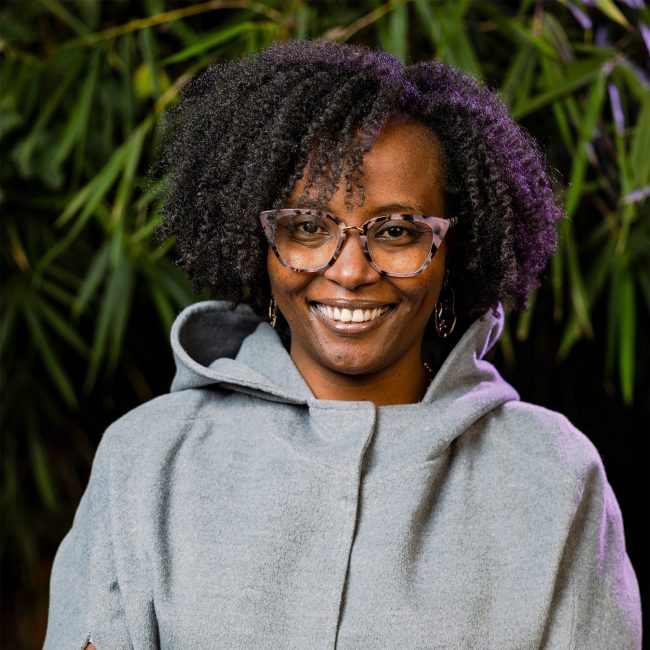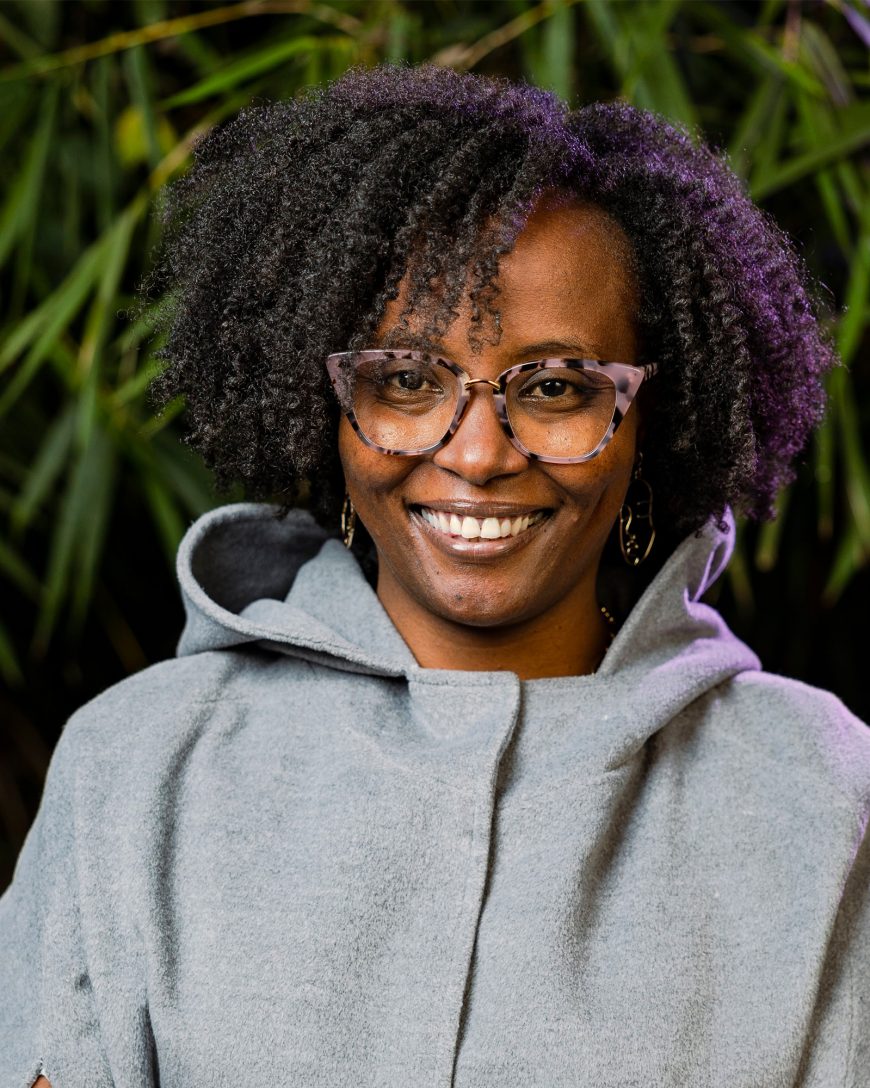Curated conversations with data and AI for social impact leaders on their career journeys
Pathways to Impact is a series of conversations with data for social impact leaders exploring their career journeys. Perry Hewitt, CMPO of data.org, spoke with Linda Kamau, executive director of AkiraChix, a social impact organization that provides young women in Africa with skills to compete economically and bridge the gender gap in technology; and talks about her passion for opening opportunities for women in the technology field.
You’re currently the executive director of AkiraChix, helping women enter and advance in careers in tech. How did you come into this work?
My background definitely informed my path: I’m a software engineer by profession. And when you work as a software engineer in different companies, it becomes obvious that there is a pressing problem when it comes to hiring and retaining female tech talent. Though this didn’t come as a surprise as I graduated as one of two women in my class, I was saddened by it and wanted to change it.
Beyond your personal lens as one of two female software engineers in your class, what else informed your belief that it would benefit society to broaden access to data and technology?
My belief that tech can empower came not only from my personal background but also from seeing how the field was picking up and changing the Kenyan landscape at the time. There were very many opportunities for people with technology skills, particularly for women. But women were being excluded from an industry that needed the very skills they had.
A good example is the launch event for the iHub, which is the first innovation hub in Nairobi. There were 200 attendees and only about 10 of them were women. Attending events and seeing very few women was a clear indication that something needed to change.
I come from a very humble background. Being able to get a job that paid me well allowed me to support my family, and to support their move from one socioeconomic status to the next. This change was an eye-opener and made me realize what could be achieved if women were included systemically. The jobs were out there, so why couldn’t we get more women in technology to fill these roles and transform their lives?
It’s no secret that when women are empowered, an entire community is transformed. I felt strongly about ensuring that we have more women taking up these opportunities. With women in these roles, there would be a shift in the intergenerational cycle of poverty within families and a significant change in the software industry.
What part of this problem are you trying to solve? What opportunity do you see?
We have a multi-pronged approach. It’s about building the talent and working to make sure that the industry is set up to absorb the talent we are providing, while simultaneously shaping the industry. There are several key aspects that we need to put in place to support young women to thrive.
First, there is an urgent need to develop the right kind of tools and resources to ensure successful hiring and retaining of female tech talent. Once they are in the industry, women need to have opportunities to upskill to allow them to compete equally.
AkiraChix builds talent based on the needs of the market. We spend a lot of time with companies to understand what they’re looking for, then train people in areas that are aligned with this. On the other hand, we work closely with these companies and offer support on how to hire junior tech talent and set them up for success.
Junior talent needs more support to thrive; they often need both scaffolding support and clear career pathways. We ensure that these companies have established proper processes that ensure employees’ career trajectory is clearly outlined. For example, one can move from an intern to junior to senior—or however far they can, and want to, rise.
There is an urgent need to develop the right kind of tools and resources to ensure successful hiring and retaining of female tech talent. Once they are in the industry, women need to have opportunities to upskill to allow them to compete equally.
Linda Kamau Founder and Executive Director AkiraChix
Secondly, we are active contributors to the building of the tech industry. As an organization, we are more than a training institute; we also act as a think tank that helps shape the tech industry. We create very concrete standards that companies can follow when it comes to creating roles and expectations for junior talent.
This need is particularly pronounced in Kenya, where — as in most of Africa — there are many startups. Most startups don’t have the time or maturity to set up these processes. AkiraChix is bridging this gap and ensuring that startups understand how to structure roles and pay grades. From a data-informed approach, we advise startups on the minimum amount an intern can be paid. Currently, based on our data, we cap it at $250.
After the internship, the intermediate level is an apprenticeship. During apprenticeship the pay increases to $400 as the role requires advanced skills: We focus on both transitioning from school to the world of work for our students and also help architect a way for employers themselves to ensure that they know how to work with new hires. This allows them to support and retain talent over time but also prevents the exploitation of young people who may be new to the workforce.
What were any unexpected blockers to your career entry or your career progression as you moved ahead from software engineer to executive?
One blocker was my unconventional educational background. My mother was not able to afford university. Ideally, I expected to be in a university for four years and then become a software engineer, but that was not possible so I embraced unconventional learning.
Having gone through an unconventional learning path, and seen its potential to set one up for success, I believe it is the best way forward when other traditional paths are inaccessible.
Another blocker, as I mentioned above, is the lack of representation of women and its resulting assumptions. There were several moments when people assumed I worked in a non-technical role because I am a woman.
How do we counter them? I step up. I always ensure that I have a seat at the table at any given point. I’m sure, in situations where I’m vocal, it’s interpreted as the “angry black woman” but I recognize that there is a need to change the narrative and change the status quo.
Is there a community of people — either virtual or in-person — that supports you on your journey?
Interestingly, I have had men who were mentors and sponsors of my work, which was particularly valuable early on. These are allies who reminded me I was good at what I do, encouraged me not to doubt myself, and identified ways for me to advance. Many of the people who’ve supported me and the organization have been there along the journey, and many come from the tech ecosystem in Kenya.
Now we’re building our alumni community, and it’s become the best support system for AkiraChix — which ultimately extends to me. We’ve now built a community that’s not only supporting AkiraChix, but also each other. It’s great to see how someone just jumps in with their problem and others are able to help out.
Other communities include AnitaB.org, which has been a tremendous supporter of our work. Now we are also creating great partnerships in the more traditional development/SDG space and getting more guidance along with fundraising. We’re working with people as we elevate the status of women in society. My community has now evolved beyond just women in tech to building careers for women in nonprofit and social impact work.
I know you’re a software engineer: are there other nontechnical skill sets that have strengthened your work? Are there unexpected skills that have enabled you to become an executive or a senior leader in your organization?
My ability to move and adapt quickly stems from my childhood. My mom was very ill; for almost a year, she was an invalid. I had to grow up too fast, and I think that shaped who I became. At that time, I had to do it for myself and for my brother. We grew up taking care of ourselves and each other as well. This definitely helped me understand who I am and my capabilities.
I’m also a very strategic thinker. That combines well with my background as a software engineer: problem-solving is what I enjoy the most. I’m comfortable asking the critical questions; how do we move? Which variables need to change? How do we do this differently?
Lastly, I believe I have a great ability to bring together and function well in any community setting. Now, communities are a very big piece of everything that I do. This whole movement that we are building for women is based around community. I know how to contribute to and mobilize communities — and everybody knows it! That ability to just give of yourself alongside others has helped me build communities that in turn support me.
Develop a skill, be good at something: if it's software, if it's hardware, be excellent at it. But don’t box yourself in. Instead, ask yourself what contribution you can make to the rest of the world with your skills.
Linda Kamau Founder and Executive Director AkiraChix
What advice do you have for someone who’s new to the field but interested in greater representation in technology and data for the SDGs or in social impact more broadly?
I was asked this earlier this year by a young person at a university, on a long ride from Switzerland to Milan! My response is always the same: Don’t box yourself in. Develop a skill, be good at something: if it’s software, if it’s hardware, be excellent at it. But don’t box yourself in. Instead, ask yourself what contribution you can make to the rest of the world with your skills. What problems can you solve? It doesn’t matter whether it’s in your exact lane; consider how you might apply that skill in another way. Can you actually use that skill to create something?
Expose yourself to broader problems to solve, because that will unlock opportunities. I didn’t think I would ever one day be running a not-for-profit. Earlier, I was focused on running my own startup, a tech company that was going to make millions of dollars. Instead, I run a nonprofit developing tech talent that relies heavily on external funding. The exposure I had early on to the startup community gave me the skills to do this; I’m glad I got the exposure, and I think more people should do the same.
My advice is always not to box yourself in; the world is open for a reason because we can always find problems and solutions that need the skillset and the tools that we have if we look broadly enough.
Part of the Pathways to Impact series
So what’s the next big thing in data that you see? What do you see emerging in data for social impact in terms of the work you do or just more broadly in the sector?
We are more of a data-driven organization. Everything we do—particularly the decisions we make—is based on data from our work. For example, we’ve just launched a new program for our alumni, codeHiveX, with a focus on growing their incomes and career paths. This was informed by data, the data we’ve seen in the last few years that helped us identify an opportunity.
As I work in the sector and spend a lot of time with the funder community, there’s a lot of growing interest in matrix-driven impact. How do we ensure that we are just not talking about the qualitative side of things? Can we actually talk about the quantitative side? Especially when it comes to livelihoods which fits really well into the SDGs focused on decent work and economic development. How do we ensure that people are getting decent jobs, with meaningful pay, and that they can sustain those jobs over time? The only way to do that is to ensure that you’ve built yourself a data-led organization. You have to think, how are you collecting, analyzing, and synthesizing that data to be able to predict the outcome of our students in the next 10 years? We need more predictive use of data and I see that coming.
What we are starting to see in the not-for-profit world is many funders are keen on the metrics that can translate and lead to future impact. Often, funders ask how we measure our impact and how the data can inform sustainability.
Are there new data collection techniques or technologies that make you better able to measure that sustained impact?
From a technology perspective, we are seeing more no-code engineering tools coming up. Not all nonprofits have engineers; these no-code engineering tools mean more people are able to see and analyze their data. In the next few years, I see these tools being very useful, especially for social impact organizations.
What’s your don’t miss daily or weekly read? What keeps you informed and sane in this world?
I’m a fan of Formula One. So I read a lot of Formula One blogs and podcasts like Silver Arrows. For general news, I spend a lot of time on Twitter; I collect a lot of data from Twitter and spend time each week reading through articles I have bookmarked.
Specifically on the development and data side, I am a big follower of the World Economic Forum, and I enjoy reading through the data and AI topics that they write about. I find myself constantly reading those. I see so many opportunities to bring women into data and AI, and we’re focused on getting the tech ecosystem ready for that. I draw inspiration from these data and AI sources to think about ways AkiraChix can help make all that happen.
About the Author
Perry Hewitt is the Chief Marketing and Product Officer of data.org where she oversees the marketing and communications functions, as well as digital product development.
Read moreSeries
Pathways to Impact
This data.org series interviews leaders in Data Science for Social Impact with a lens of how they got there, as well as the skills and experiences that have fueled their career progression.
data.org In Your Inbox
Do you like this post?
Sign up for our newsletter and we’ll send you more content like this every month.
By submitting your information and clicking “Submit”, you agree to the data.org Privacy Policy and Terms and Conditions, and to receive email communications from data.org.


